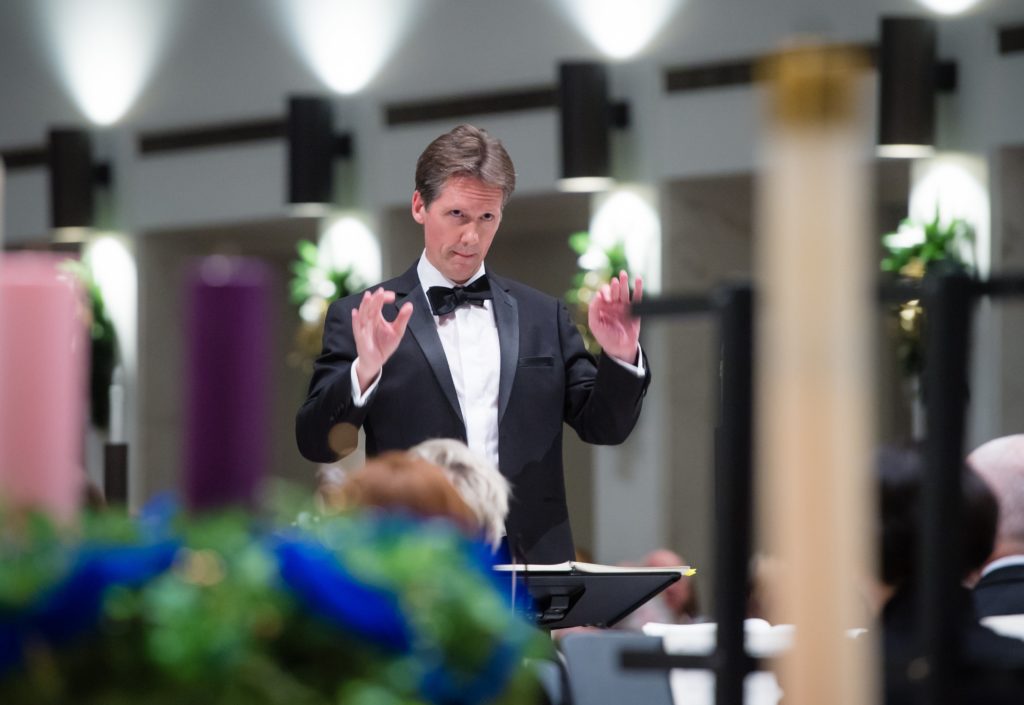Dana Marsh’s Debut With Bach Consort
By • September 17, 2018 0 1363

Even if you can’t tell Bach from Brahms, a recitative from an aria or a consort from a cantata, you could tell there was something special going on last Sunday, Sept. 16, at the National Presbyterian Church on Nebraska Avenue, which reaches up to heaven just after you pass the McDonald’s on the corner of Wisconsin Avenue and Van Ness, near American University.
It felt kind of official, like a groundbreaking or a historical wedding of sorts, an offering of earthly as well as heavenly music, as the Washington Bach Consort took its first steps into the future with its 2018-19 season-opening concert, under the baton of new Artistic Director Dana Marsh.
To a newcomer, the concert — “Handel & Bach: Sing a New Song” — seemed auspicious. It gave off the vibe of something more than a concert. Marsh was the choice of a search committee represented by the community as well as by the leaders of the consort, founded by the highly regarded, charismatic and much beloved J. Reilly Lewis.
On June 9, 2016, Lewis died unexpectedly of a massive heart attack at the age of 71. The Washington Bach Consort was bereft — not only of leadership but of a major personality, who practically glowed with knowledge and the energy of an enthusiast.
The year-long search included a series of auditions, the result of which was the arrival of Marsh, 53, currently associate professor of music and director of the Historical Performance Institute at the Indiana University Jacobs School of Music. He comes with quite a lineage (his father was a violinist) and resume as a performer and conductor. He began as a boy chorister at St. Thomas Choir School in New York and received an undergraduate degree in organ performance from the Eastman School of Music and advanced degrees in historical musicology from the University of Oxford. He studied Bach arias under Max van Egmond in Amsterdam.
Marsh’s depth of knowledge, on paper, seems intimidating to a novice, but the voice on the telephone is full of the eagerness of a college freshman, a gymnast eager to get on the trampoline. “Bach seems in the distant past, but here is why he is still so important to us today,” he explained. “From the beginning, Bach and his music have had an impact because, simply put, he strikes a chord in the human heart. Harmonically speaking, his music speaks to the human spirit.”
The eagerness relates to impact. Marsh is taking the reins of an institution, certainly in Washington and probably a national institution at that. “That can be daunting, sure,” he said. “But I am looking forward to this so much.
“I can’t think of a higher honor than the artistic helm of an organization like this. I look forward to building on Reilly’s profound legacy, to elevate both the quality and profile of this valuable community of musicians.”
The Washington Bach Consort is often considered to be something on the order of a hidden treasure, a kind of elevated community that is buoyed by a love for Bach — a particularly generous and voluminous kind of Bach, music that inspires not just our better angels, but our better archangels. Plus our better artists, who of a Sunday afternoon enriched a corner of the world with continuity.
While what was offered in Sunday’s concert may have its familiarity to devotees, the church — every pane of stained glass and the clean, modernistic cross hanging from on high — the concert and the occasion had the sharp clarity of emotion deeply felt, attached to memory.
Speaking from a position as a novitiate, not as a critic of any sort, the occasion was bracing, as if somebody had opened the windows to a new day.
Marsh, who exuded energy on the phone, did the same with his entrance, arriving in a way that suggested that he had come to be a permanent presence, not a visitor shiny with newness. He proffered confidence and authority, a certain youthful exuberance and respect and affection for his predecessor.
If you know little in terms of what was being played, you end up noticing a lot, going from Johann Sebastian Bach’s “Singet dem Herrn ein neues Lied” to George Frideric Handel’s Ode for St. Cecilia’s Day to the second half and, brief as a bittersweet new thought, Bach’s Magnificat in D.
This was like discovering a new balm for whatever might ail you, or for whatever might be missing or had not been felt for a while. For me, it was hearing German, for one thing, my native tongue, doing what it was supposed to do, which can be, at times, masterful exultation.
It was baritone Steven Combs working in high fashion. It was soprano Amy Nicole Broadbent delving with increasing intensity into an aria that begins with: “The soft complaining Flute in dying notes discovers.” It was the chorus boldly and emphatically ending the Ode for St. Cecilia’s Day with: “The dead shall live, the living die, and Music shall untune the sky,” a line Shakespeare himself couldn’t have written better, let alone sung.
The audience sported a dash of informality mixed in with blazers and ties. Feeling very much like a shared experience in the comfort of company, the concert made you remember what more there is than the daily headlines of travesties and tragedies.
Marsh was deft in the handling of the chorus. If the audience response was any indication, one could sum his debut in a single word: “Magnificat.”

